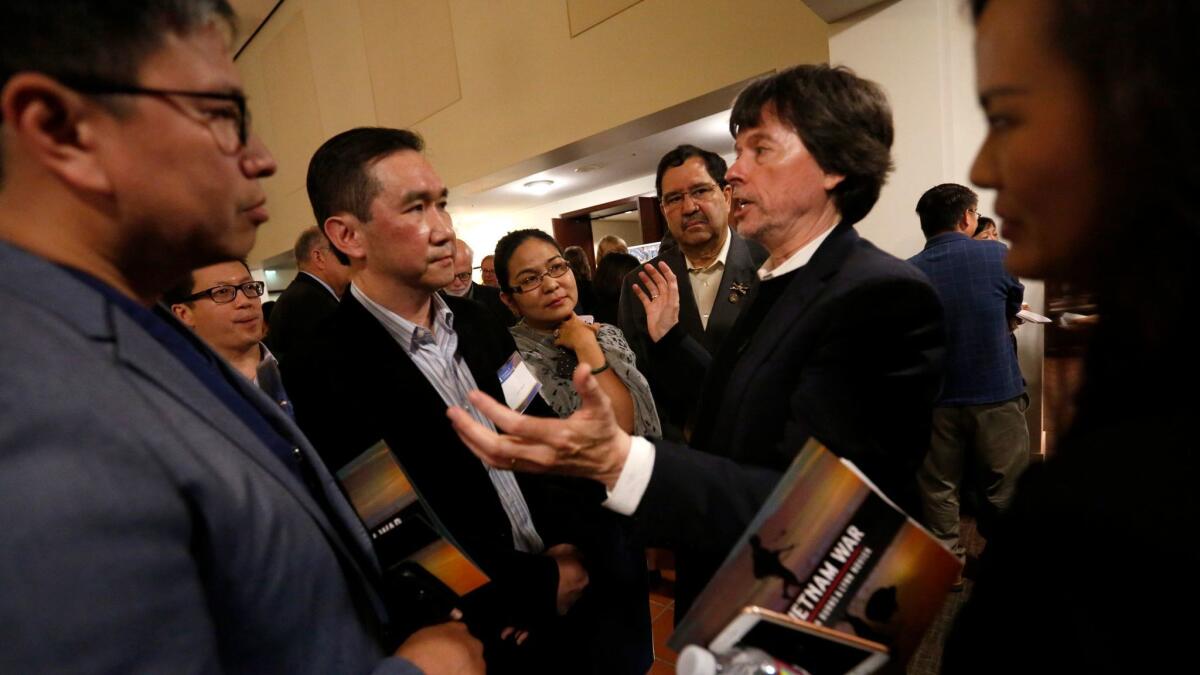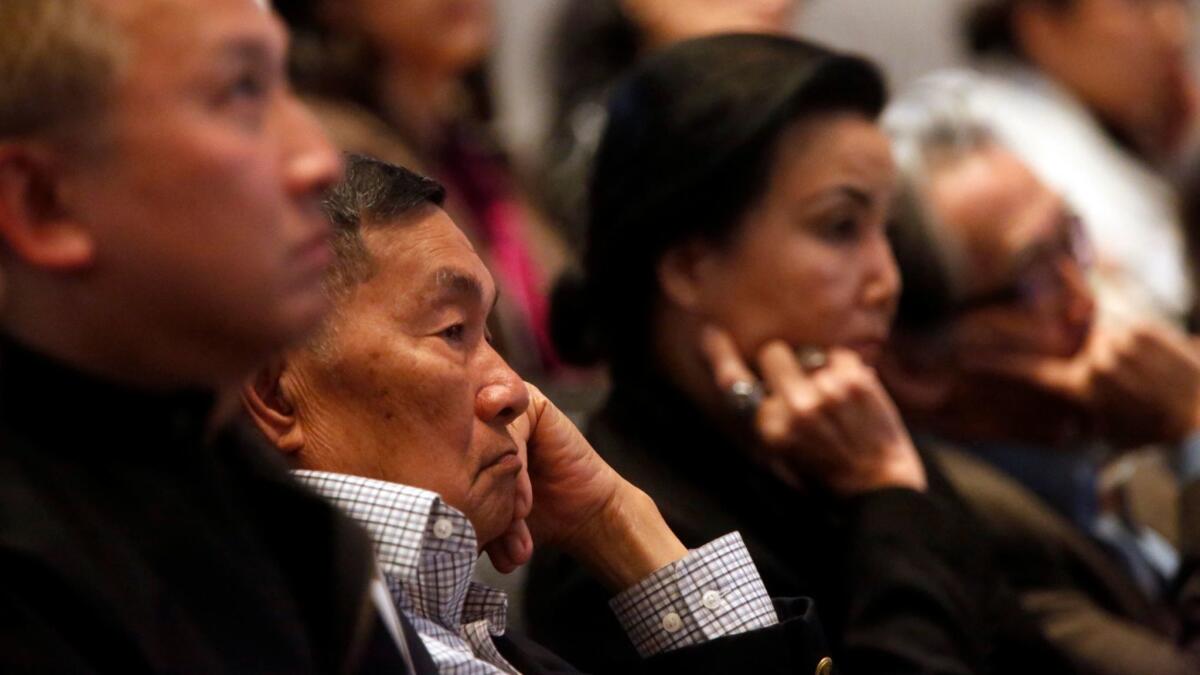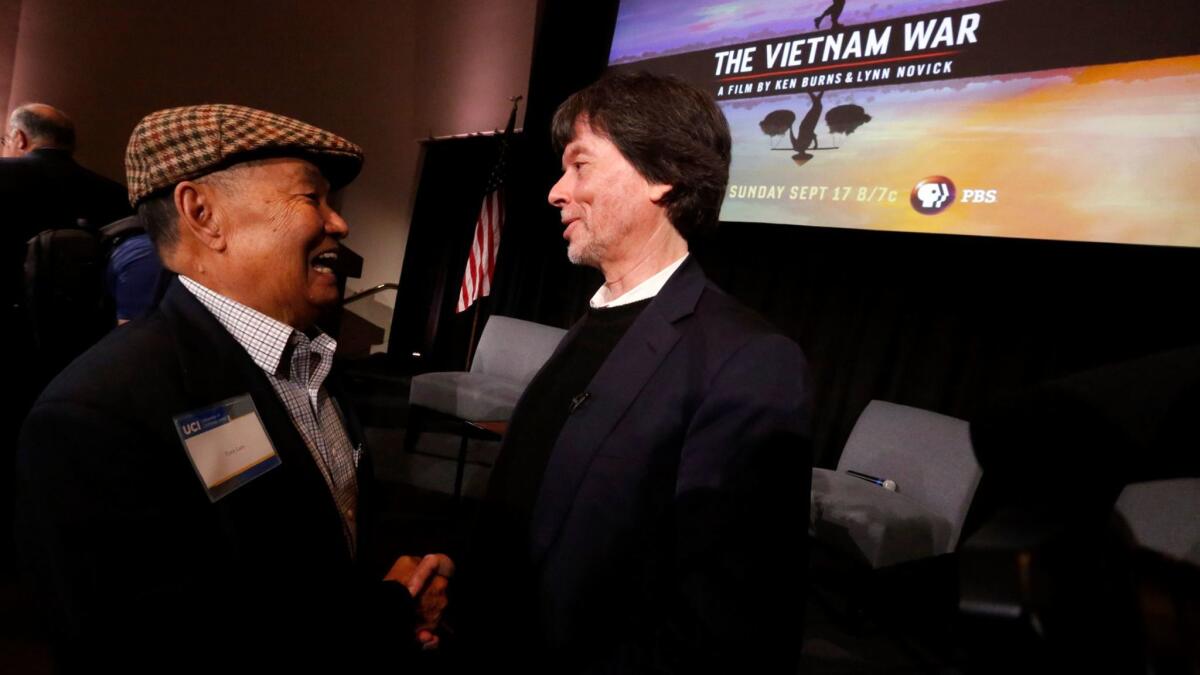For Orange County Vietnamese, a film about the war shares a glimpse into their past life

- Share via
In the eighth row of the darkened auditorium, Tien Nguyen covered part of his face to wipe away tears as he watched images from a familiar past: torched villages, bombings, rotting corpses.
Acclaimed filmmaker Ken Burns had come to Orange County, the pulse of America’s largest Vietnamese American community, to preview his new documentary, “The Vietnam War.”
For many of the nearly 150 people sitting in the Beckman Center of the National Academies of Sciences and Engineering at UC Irvine, the war was something that, more than 40 years after it ended, they still felt in their bones.
Nguyen, a computer programmer from Mission Viejo, had waited with much anticipation for the partial screening of the documentary, which will span 18 hours and 10 episodes when it airs in September on PBS.
“This raised even more questions than it answered,” Nguyen, 51, said. “It makes me wonder how it will wrap up. Do they focus on the saga of the boat people or the reeducation camps? Really, to understand the war, you need to understand the before and after. The post-war is what our people are still dealing with.”
Burns and fellow filmmaker Lynn Novick had held earlier screenings in places like Boston, Houston and Pasadena. But here was the largest Vietnamese population outside Vietnam, with more than 300,000 people owing their lives to an exodus of refugees. And this was a community that has become ultra-political and sensitive to issues — such as communism — related to the war.
As a crowd gathered around Burns at a reception after the Monday viewing, he described his film as “complicated, rigorous and multigenerational.” In an interview before the screening, he said: “Our obligation as filmmakers is to remind people of the costs of war. After all, this is one of the important events in the second half of the 20th century, and we need to share what we all know of it.”

Around Nguyen, writers and doctors, bankers and small-business owners said the remastered archival footage fascinated them — even as they reserved judgment.
“We just saw a small glimpse. We need to be accepting. Some of us can’t be fanatics when it comes to interpretation of history. Our community is so big now, we have power to invest in the past and use art to teach our children about that past,” said Tony Lam, the first Vietnamese American elected to political office in the U.S. in 1992.
Lam, 81, a retired Westminster councilman, spoke of the growing clout of Vietnamese Americans in a county once considered a solidly conservative bastion in part because it drew high numbers of refugees who registered as Republican after they fled Vietnam and became U.S. citizens.
“No one can ever forget the horror or the tragedies, as this film illustrates,” said Thuy Vo Dang, an archivist for the Southeast Asian Archive at the UC Irvine Libraries. “And you can’t miss showing it in O.C. We are the cultural hub.”
Nguyen said that if the film had been screened on Bolsa Avenue, the main drag of Orange County’s Little Saigon, the reaction might have been different.
“There are those who would want to see this, but wouldn’t go to a college campus for it. In their own area, they could speak more honestly about their feelings.”
Burns and his team included testimony from nearly 100 witnesses, including American veterans and those who protested the war, along with Vietnamese combatants and civilians from both sides of the conflict.
Long Dinh, 76, who managed the Vietnamese Air Force press corps, said he emerged from the screening “very moved” as he reflected on the haunting scenes.
“I could not imagine that they would have that many voices in a film,” he said, “and often voices you did not hear from in the past.”

Dinh, of Huntington Beach, is eager to see the rest of the documentary, saying: “Who knows who else could appear?”
Hugh Nguyen, Orange County’s clerk-recorder, said much of what he has learned about the war is filtered through the lens of the History Channel. At 49, he’s the child of an American serviceman who died in battle and a Vietnamese teenage mother who later abandoned the family. His grandparents and aunt brought him to the U.S. in 1975, following the fall of Saigon. They raised him. He can never shake off the memories of taunts from cruel children who picked on him during the early years because he was of mixed race.
“We thought we would be killed as children, and my grandparents were so scared, they briefly gave me up to the orphanage to keep me safe,” he recalled. “War is about emotions, and I would hope that the documentary pays attention to some of the quiet fears.”
The film, a decade in the making, included the experiences of Duong Van Mai Elliott, author of “The Sacred Willow: Four Generations in the Life of a Vietnamese Family,” which shone a light on the devastating choice that split Vietnamese clans. Her eldest sister escaped her staunchly anti-communist home to join the communist forces from the north, spending months sleeping with an infant son in jungle camps.
Elliott, 76, is featured in every episode of the documentary, playing to Burns’ strength of telling smaller stories within the larger landscape of a human drama. She and husband David Elliott, professor emeritus at Pomona College who taught political science and who is fluent in Vietnamese, served on the film’s advisory board.
“The stew of thoughts and images that they have woven together is something quite rare,” said Elliott, of Claremont. “I’ve watched every film on the war, yet this film surprised me with its freshness and its willingness to include not just one side, or two sides, but so many sides.”
Novick, Burns’ co-filmmaker, said: “We stayed open to any criticism from the advisors. They’re the experts. And we knew we had to come to this community to hear more, to learn more.”
Burns expressed hope that the audience would watch the entire series.
“You know, America still has not recovered from the Vietnam War. The divisions that existed then still make many people suffer today. But we’ve reached a point where we can gain from their wisdom,” he said of the people who experienced the conflict firsthand. “You combine that wisdom with emotion, with scholarly work.”
More to Read
Sign up for Essential California
The most important California stories and recommendations in your inbox every morning.
You may occasionally receive promotional content from the Los Angeles Times.














